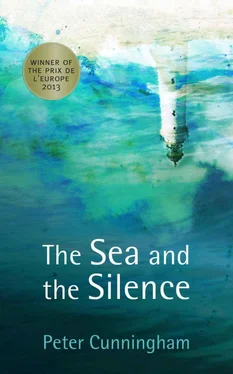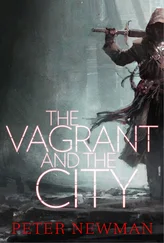We had been invited to Mount Penrose for Christmas, but Mother was relieved when I suggested we stay at home. Still, Norman Penrose was one of the very few who made the journey up our avenue — on the pretext of checking the farm. He came in and stood in front of the fire and drank tea laced with whisky. I made sure that Mother stayed put on these occasions, for I would not have been able for Norman on his own. And yet, there was an inexorability about him that led me, despite myself, to go to bed some nights thinking the unthinkable.
I considered running away, but there was still a war on and one could go nowhere. We had no money coming in and the bank had begun writing us stiff letters. The staff at Longstead, or what few remained, knew the dire situation, but at least in Longstead they had a roof over their heads and the produce, however disorganised, of a 1,500-acre farm. Although the war was as good as won, it still hung over us even on a good day, we who lived in a country that was meant to be at peace.
A week after Christmas, John Rafter delivered a box of provisions which I brought to the kitchen and unpacked. The box was lined with newspaper. Something caught my eye. I removed the paper from the box and smoothed it out. I had to sit down to steady myself. A man and a woman stared out from their photographs beneath black headlines. The paper was three weeks old. The couple had been shot dead in an ambush in Tipperary by armed members of the detective bureau. Both had been members of the IRA. His name was Stephen Duggan. Hers was Alice Waters.
As if a trowel had been taken to where my recent grief had been heeled in, now it was laid bare again without remorse. It was not just that death seemed so near, or so shocking, but that life itself suddenly seemed so trivial. Overwhelming, too, was the feeling that I was so utterly marginal to important events. I, who thought she had been at the centre of developments, learned of them only weeks in arrears from discarded newspapers.
I wondered if Frank’s picture had appeared in some newspaper or other, and if he too was dead or just locked in a jail. He might well have been, for all we knew in Longstead. I grieved then, not just for him again, but for his sister and for Stephen Duggan, a man I had seen just once. I had been foolish to think that the wedge driven by centuries between our different classes could be removed by something as insubstantial as love.
I thought much of love during those days and came to see it as just an ideal that men strove for, like truth or liberty, unattainable in any absolute sense. One man’s truth was another’s lie and what was freedom to one was slavery to the next. Life was about survival, about using what you had to best advantage and in not throwing away everything in a moment of madness.
I came in at noon one day in mid-January and saw the pile of unopened post lying on the table in the breakfast room. I had begun collecting the bills and other pieces of business correspondence, since if they went through Mother’s hands they invariably disappeared, and letters concerning Daddy’s estate which a solicitor in Navan was dealing with. I sat down and began to slit open all the envelopes. When I lifted the last one, I saw the telegram. It lay there in its green buff with the utmost sinisterness. I realised a number of things at once: that Mother must have taken separate delivery of the telegram and decided not to open it; that she must then have hidden it beneath the pile of letters, knowing that I would discover it. I realised then too that the entire house was hushed. Listening. Waiting for me to come in here and do what Mother had been unable to do. What else do I remember? I’ll tell you what — the silence of death that lay everywhere, at whose centre I stood.
We had no one to bury, for Allan was never found. The beautiful, clear-eyed boy who loved his horses and his fishing and who would come home and put everything to rights had been obliterated by a mine. I remember little of the next days, just that my body seemed like a well ever primed by grief. I wept without cease.
At the memorial service, I heard but every other word from our rector, a tired-looking man who spoke of love and suffering and compassion. I wanted him to say how justice lacked in even the most fundamental sense, about the basic unfairness in nature and, if he existed at all, which I doubted, of God’s unremitting cruelty. God seemed to have us singled out for the most heartless of his games. But our game was now as good as over. I knew what had to be done.
Bella, married and pregnant, arrived home with Nick. Harry came from London and Lolo drove down from Fermanagh with her husband. Our allies gathered from every corner of Ireland, some of whom I had never before seen and, in all likelihood, never would again, but they had been galvanised into action despite fuel rationing, floods and great distance, as if our shoring up was a sudden but vital campaign in the survival of our kind. They were of all ages and frequently bizarre in appearance, centuries mattering little for changes in dress or deportment, and almost all of them were determined to display that shining, outward resilience and imperviousness to grief which is the traditional hallmark of the colonist. From Monument came the Shaws, Ronnie’s parents, a lopsided, always half-smiling man and a big, angular woman who introduced herself as Peppy.
‘Ronnie knows, dear. He’s devastated,’ she said and kissed my cheek, although it was the freezing cold tip of her big nose that I felt most. ‘He wants you to know you’re in his thoughts constantly.’
‘I’m glad he’s well,’ I said.
‘Ronnie is like his father, he’ll enjoy himself wherever he goes, even during a war,’ she said. ‘Do you know that when his regiment shipped out for France, he brought two sets of hunting boots, trees intact?’
I smiled.
‘Ronnie was right,’ Peppy said. ‘You’re divine.’
‘How is… Monument?’ I asked, unable to stop myself.
Peppy Shaw’s pale eyes were flecked at their centres with shards of knowing grey.
‘Some people don’t seem to understand that their particular war has long been won,’ she said quietly. ‘There’s no need of guns and bullets. They who once ruled are finished, by which I mean “we”. This is the country of young Ireland now and time is all that is needed for it to come of age.’
Our tragedy had cut through local politics too, it seemed, for men from all parties assembled at our church, and even though it was forbidden by their own religion, many of them came inside. Later, the house was thronged and warm and people shouted to be heard. Mother sat, mute, as though winded by a fall, the Misses Carr, disconcerting replicas, either side of her.
‘Iz, we must talk.’
One would have liked to say how pregnancy suited Bella, how she had bloomed; alas, her bump looked more like an impediment which she was powerless to navigate. We went upstairs to what was still referred to as Bella’s bedroom. Lolo, poor, dear Lolo, had begun to resemble Daddy in the way she scowled, closed the door. Bella said, ‘He has been mentioned in dispatches.’
‘That’s a huge thing,’ Harry said. ‘It’s like a decoration’.
How superfluous the term decoration , I thought.
‘Mother has no idea,’ Lolo said.
‘I think she understands more than all of us,’ I said.
Harry stood, hands in his pockets, looking out the bedroom window. ‘I saw you speaking to Rafter,’ he said to Bella.
‘Mr Rafter is the best friend we have,’ Bella said, avoiding my amused look. ‘He has told me exactly where we stand. He says it’s now a matter of weeks rather than months. Unless there are developments.’
‘I thought the fact they had all come to pay their respects rather meant that we had escaped all that,’ Lolo said.
Читать дальше












![Edward Ellis - Adrift on the Pacific - A Boys [sic] Story of the Sea and its Perils](/books/753342/edward-ellis-adrift-on-the-pacific-a-boys-sic-s-thumb.webp)